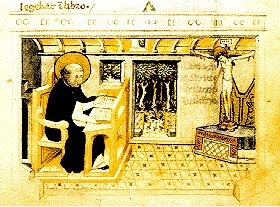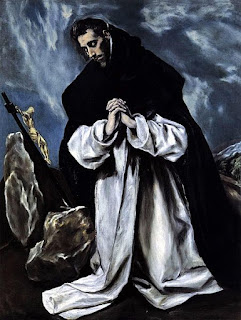Newly ordained in the early 1980's, another priest and I traveled to France to visit a number of pilgrimage sites like Paris, Lourdes, Amien, Lisieux and Reims. One tiny village (then a population of just over 300) was Sainte Fiacre ~ Seine-et-Marne, the home of Saint Fiacre of Meaux. I told Fiacre's story here at the start of the growing season (May 26).
My clerical companion was much less devout than I - far more interested in restaurants than shrines. Still, he was a good sport about it all and went along saint-hunting with me. We spent the better part of a morning tracking down the saint's tomb.
Fiacre was an Irish monk but (can you imagine!) he couldn't find adequate reclusion in Ireland and so sailed to France to preach the gospel. He settled at Seine-et-Marne, north of Paris, built a chapel in honor of Our Lady and planted a large vegetable garden (replete with herbs) to feed the many pilgrims who sought him and to cure their ailments. Fiacre is the Patron Saint of Gardeners and his feast is kept today at Ossory in Ireland and a few places in France.
Now the priest traveling with me joked that if we found the village I might meet the mayor who would say, "Fiacre, who?!" But right here in the middle of the small village was a stone church bearing Fiacre's name and his statue over the door. There was an impressive memorial outside to the soldiers who died in the First World War, but the front door was locked.
My chauffeur and guide, a French-speaking American who worked for the American government hunting down art smugglers, strode across the street and introduced himself to the lady at the door. "Can you help? This priest is from the States and would like to see the interior of the church." She disappeared briefly and returned, kindly handing off a huge and ancient black metal key.
The priest shortage in France is dire; there are churches in far-flung places where Mass is celebrated only once a year. This poor church felt abandoned: dirty, run down, moldy, musty. But up front to the left of the altar was a very small room containing Fiacre's tomb (the saint in effigy) AND a post-card rack with yellowed, black and white pictures of the church taken in the 1920's or 30's. "Fiacre who?" Indeed!
To the right of the altar was a Medieval-style crystal case containing the relic of Fiacre's arm. I hiked up the circular staircase to see the bells, repeating every step, "Remember this moment. Remember this moment," picked up a souvenir stone from the church yard, returned the key and set out for Lisieux - a happy pilgrim.
How precious is Your loving-kindness, O God!
Therefore the children of men
put their trust under the
shadow of Your wings.
They are abundantly satisfied
with the fullness of Your house,
And you give them drink from
the river of Your delights.
Psalm 36:7,8




























